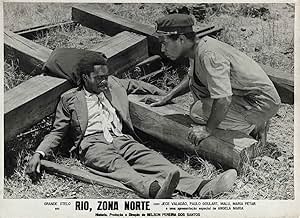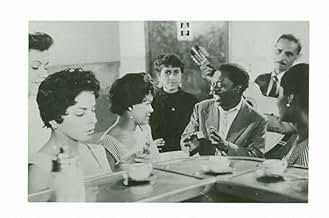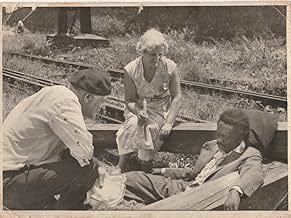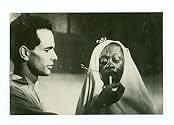Um talentoso compositor de samba é obrigado a enfrentar as injustiças sociais da cidade ao seu redor.Um talentoso compositor de samba é obrigado a enfrentar as injustiças sociais da cidade ao seu redor.Um talentoso compositor de samba é obrigado a enfrentar as injustiças sociais da cidade ao seu redor.
- Direção
- Roteirista
- Artistas
- Prêmios
- 1 indicação no total
Avaliações em destaque
Rio, Zona Norte is a musical drama that explores samba in a very interesting way. We follow a great unknown artist and when he has a huge opportunity, things don't happen as they should. A man invisible to the eyes of society and who would never be recognized because of his conditions. It's an exciting and realistic experience. An experience that reveals to us that the world of music is not as beautiful as we imagine. The protagonist is charismatic, his story is emotional and Nelson Pereira dos Santos manages to create more closed shots that put us directly in front of these emotions. Right from the beginning of the film, it makes you curious about what is going to happen. The ending is not satisfactory, it is sad, it is raw. A Brazilian film, certainly one of the best in history.
In 1955, 27 year-old director Nelson Pereira dos Santos took Brazilian cinema by storm with his feature film debut, the ground-breaking and independently made "Rio 40 Graus", the single most important Brazilian film of the 1950s, changing Brazilian cinema forever. NPS took a bold, rough look at Brazilian reality following Italian Neo-Realism principles: talking about "real people with real problems", working on location, improvising, mixing professional and non-professional actors, choosing "ordinary" daily stuff as themes, refusing "beautiful" photography and "beautiful" stars, avoiding patronizing treatment of "the happy poor". It was the movie that inspired the Brazilian Cinema Novo (New Cinema) Movement of the 1960s, as it dealt with "uncomfortable" but urgent social issues and, even more importantly, proved that independent production was possible for young filmmakers.
"Rio Zona Norte" (1957) is NPS's following film, the second of a planned trilogy about Rio de Janeiro (the third one was to be called "Rio Zona Sul" but was never made -- though his 1967's "El Justicero" might fill in for the part). It's the story of black samba composer Espírito da Luz (Brazil's most popular black star Grande Otelo), who lives in dire poverty in one of Rio's Northern Zone's favelas (slums), whose only joy in life is music and whose major dream is to have singing star Ângela Maria (playing herself) record one of his sambas. He suffers a railroad accident and, as he agonizes, recalls his miserable life: his unsuccessful attempts to break through the corrupt music business of the 1950s, when it was still common practice for samba composers to sell their songs (and copyrights) to famous singers and agents; the sleazy song-stealing music agent (Jece Valadão) who poses as benefactor and friend; his doomed, delinquent son (Haroldo de Oliveira); his lover (a single mother) who abandons Espírito as she realizes his dream of celebrity is an illusion; his white classic musician friend (Paulo Goulart) who promises to help him but is all good intentions and no action. Espírito's songs are stolen to the same effect as the bicycle in De Sica's Neo-Reealist classic: what's stolen is the only possible means to dignified living and citizenship.
Based on the real-life experiences of great samba composer Zé Kéti (who wrote the songs for "Rio Zona Norte" and has a cameo as singer Alaôr, and for whose memory NPS directed his 2001 documentary "Meu Compadre Zé Kéti"), "RioZN" avows NPS's artistic and political commitment as he places doomed, pauper black people at the center of his movie, something unthinkable until then in Brazilian films, and deals with uncomfortable (and perhaps far too many) themes: racism, social prejudice, the state's failure to assist the poor, illiteracy (Espírito's inability to write down his own music is an important part of the story), single motherhood, juvenile delinquency, corruption in the music business, the sterile patronizing of intellectuals and the petty bourgeoisie (a self-criticism NPS -- white and educated himself -- is smart enough to make).
NPS slips into some patronizing himself -- most of the poor are "bons sauvages"; the whites, politicians, bourgeois are mostly shady characters. The film is hampered by excessive sentimentality (a major problem with many Italian Neo-Realism films) and occasionally phony dialogs. "Rio Zona Norte" seems dated today, much more so than "Rio 40 Graus"; perhaps because in the last 50 years we've been consistently hardened by the escalating bleakness in reality and films. Violence in the favelas of 1955 was limited to fist fights and jackknives, instead of the lethal weaponry of military proportions that dominate the favelas today (q.v. the 1999 documentary "Notícias de uma Guerra Particular"). What hasn't dated -- and it's shocking to realize it -- is the unchanged poverty of Rio's favelas, confirming the State's total failure and lack of interest in assisting the destitute, or, as some have put it, in keeping them perennially segregated.
Still, some scenes resist well: Espírito trying to comb down his wiry hair in his desolate shack; the new song he sings at the samba school; and especially the scene where the most famous Brazilian singing star of the 1950s, Ângela Maria -- young, pretty and a real-life example of rags-to-riches -- sings Espírito's samba in her unique, effortless, then magnificent voice. Otelo's performance here, as he experiences his composer's dream come true, is amazing: his face suddenly opens up and his eyes glow with joy and heartfelt emotion.
As with De Sica and Rossellini, NPS mixes professional (most of them) and non-professional actors. Grande Otelo was then at the height of his popularity he has the perfect Fach for the role (he's almost like a black male Giulietta Masina, and just as short, clownish, funny, moving and talented) and hits the right notes most of the time, only rarely slipping into over-acting. Jece Valadão, as the sleazy agent, is at once virile, seductive, and deceitful with his rugged good looks, showcasing the star quality that would lead to his long career as macho anti-hero. Paulo Goulart tries his best with his difficult, "guilty" white bourgeois role but certainly looks handsome and sensitive. The supporting cast varies from effective to amateurish.
The favela locations, starkly captured by Hélio Silva's camera, and the songs by Zé Keti are the soul of the movie. Unfortunately, Alexandre and Radamés Gnattali's mellow, grandiose score fights with the bleak images of the simple story, and is to blame for much of the "sentimental" tone (just as Alessandro Cicognini's and Renzo Rossellini's music hampered much of Italian Neo-Realism starkness).
If you're interested in Brazilian film history or if you're are a fan of NPS, Grande Otelo, Angela Maria or the "other side" of Rio in the 1950s you can't miss "Rio Zona Norte"; others, be prepared for a dated, now naive, but still forceful, never boring film.
"Rio Zona Norte" (1957) is NPS's following film, the second of a planned trilogy about Rio de Janeiro (the third one was to be called "Rio Zona Sul" but was never made -- though his 1967's "El Justicero" might fill in for the part). It's the story of black samba composer Espírito da Luz (Brazil's most popular black star Grande Otelo), who lives in dire poverty in one of Rio's Northern Zone's favelas (slums), whose only joy in life is music and whose major dream is to have singing star Ângela Maria (playing herself) record one of his sambas. He suffers a railroad accident and, as he agonizes, recalls his miserable life: his unsuccessful attempts to break through the corrupt music business of the 1950s, when it was still common practice for samba composers to sell their songs (and copyrights) to famous singers and agents; the sleazy song-stealing music agent (Jece Valadão) who poses as benefactor and friend; his doomed, delinquent son (Haroldo de Oliveira); his lover (a single mother) who abandons Espírito as she realizes his dream of celebrity is an illusion; his white classic musician friend (Paulo Goulart) who promises to help him but is all good intentions and no action. Espírito's songs are stolen to the same effect as the bicycle in De Sica's Neo-Reealist classic: what's stolen is the only possible means to dignified living and citizenship.
Based on the real-life experiences of great samba composer Zé Kéti (who wrote the songs for "Rio Zona Norte" and has a cameo as singer Alaôr, and for whose memory NPS directed his 2001 documentary "Meu Compadre Zé Kéti"), "RioZN" avows NPS's artistic and political commitment as he places doomed, pauper black people at the center of his movie, something unthinkable until then in Brazilian films, and deals with uncomfortable (and perhaps far too many) themes: racism, social prejudice, the state's failure to assist the poor, illiteracy (Espírito's inability to write down his own music is an important part of the story), single motherhood, juvenile delinquency, corruption in the music business, the sterile patronizing of intellectuals and the petty bourgeoisie (a self-criticism NPS -- white and educated himself -- is smart enough to make).
NPS slips into some patronizing himself -- most of the poor are "bons sauvages"; the whites, politicians, bourgeois are mostly shady characters. The film is hampered by excessive sentimentality (a major problem with many Italian Neo-Realism films) and occasionally phony dialogs. "Rio Zona Norte" seems dated today, much more so than "Rio 40 Graus"; perhaps because in the last 50 years we've been consistently hardened by the escalating bleakness in reality and films. Violence in the favelas of 1955 was limited to fist fights and jackknives, instead of the lethal weaponry of military proportions that dominate the favelas today (q.v. the 1999 documentary "Notícias de uma Guerra Particular"). What hasn't dated -- and it's shocking to realize it -- is the unchanged poverty of Rio's favelas, confirming the State's total failure and lack of interest in assisting the destitute, or, as some have put it, in keeping them perennially segregated.
Still, some scenes resist well: Espírito trying to comb down his wiry hair in his desolate shack; the new song he sings at the samba school; and especially the scene where the most famous Brazilian singing star of the 1950s, Ângela Maria -- young, pretty and a real-life example of rags-to-riches -- sings Espírito's samba in her unique, effortless, then magnificent voice. Otelo's performance here, as he experiences his composer's dream come true, is amazing: his face suddenly opens up and his eyes glow with joy and heartfelt emotion.
As with De Sica and Rossellini, NPS mixes professional (most of them) and non-professional actors. Grande Otelo was then at the height of his popularity he has the perfect Fach for the role (he's almost like a black male Giulietta Masina, and just as short, clownish, funny, moving and talented) and hits the right notes most of the time, only rarely slipping into over-acting. Jece Valadão, as the sleazy agent, is at once virile, seductive, and deceitful with his rugged good looks, showcasing the star quality that would lead to his long career as macho anti-hero. Paulo Goulart tries his best with his difficult, "guilty" white bourgeois role but certainly looks handsome and sensitive. The supporting cast varies from effective to amateurish.
The favela locations, starkly captured by Hélio Silva's camera, and the songs by Zé Keti are the soul of the movie. Unfortunately, Alexandre and Radamés Gnattali's mellow, grandiose score fights with the bleak images of the simple story, and is to blame for much of the "sentimental" tone (just as Alessandro Cicognini's and Renzo Rossellini's music hampered much of Italian Neo-Realism starkness).
If you're interested in Brazilian film history or if you're are a fan of NPS, Grande Otelo, Angela Maria or the "other side" of Rio in the 1950s you can't miss "Rio Zona Norte"; others, be prepared for a dated, now naive, but still forceful, never boring film.
10guisreis
What a fantastic movie by master Nelson Pereira dos Santos, starred by wonderful super-actor Grande Otelo. Everything is not less than perfect: direction, cinematography, script, and obviously soundtrack (fantastic samba songs!). It is a drama - indeed a tragedy - on the life of poor black samba composers, who very often have no opportunities and are acknowledged (if so) only after death. It is the difficult life in periphery, in slum. The film is so moving because, besides very well done, it is true. And the shining big eyes of Grande Otelo, which were able to say what most mouths are unable to, make the truth even truer and deeper. One of the best Brazilian films ever and a top quality world class movie, for sure.
Você sabia?
- CuriosidadesLoosely based on the life of samba composer Zé Kéti, a friend and collaborator of director Nelson Pereira dos Santos, with whom he previously worked in "Rio, 40 Graus". All of the sambas credited to the character of Espírito in the film are Kéti's.
- ConexõesFeatured in Cartola: Música para os Olhos (2007)
Principais escolhas
Faça login para avaliar e ver a lista de recomendações personalizadas
Detalhes
- Tempo de duração1 hora 23 minutos
- Cor
- Mixagem de som
Contribua para esta página
Sugerir uma alteração ou adicionar conteúdo ausente

Principal brecha
By what name was Rio, Zona Norte (1957) officially released in Canada in English?
Responda























